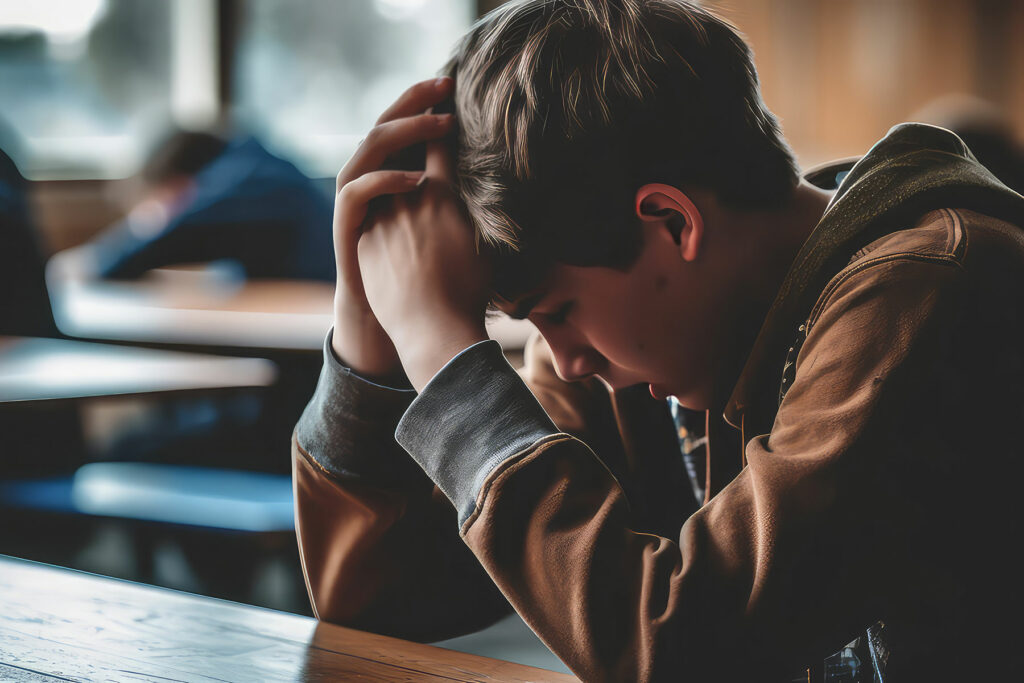The teenage years are trying in the best of circumstances. The awkwardness of maturing physically, emotionally, and socially, all while an adolescent’s body chemistry is changing and hormones are awakening, leaves young people especially vulnerable to developing mental health concerns. The everyday stressors of adolescence—puberty, peer pressure, judgment, bullying, social ostracizing, or family dysfunction, to name a few—are all potential triggers to crisis.
If you or someone you love could use an adolescent treatment program for a variety of mental health issues, contact Honey Lake Clinic at 888.428.0562 today.
Mental Health Issues in Teens
The World Health Organization (WHO) estimates that among adolescents worldwide, somewhere between ten and twenty percent struggle with mental health issues. Generalized anxiety, major depression, and social phobias (severe feelings of self-consciousness and insecurity in social settings) are the most prevalent mental health concerns among teenagers.
While no specific cause for mental health issues in teens can be identified, several biological and environmental elements have been identified as risks or contributing factors.
Causes of Mental Health Issues in Teens
Mental illness has a long and well-documented history of biologically based risk and contributing factors. Biological factors include genetics, brain chemistry, hormones, nutrition, and gender—essentially anything physical that can harm our mental well-being.
Genetics
Our genes may make us more vulnerable to certain mental disorders, such as anxiety and depression. Adolescents who have a parent or close relative struggling with mental illness are statistically at higher risk for the development of their own mental disorder.
Brain Chemistry
As our brains are the control center of our body and nervous system, their chemistry is integral to assessing, processing, and adapting to life’s circumstances and responding to life’s stressors.
Neurotransmitters are our brain’s natural chemicals, which facilitate communication between our brain’s cells. An imbalance of our brain’s chemicals occurs when too many or too few neurotransmitters are firing in response to certain stimuli.
Hormones
Hormones are brain chemicals that help regulate our body’s emotional stability. You’ve heard reference to hormonal imbalance in teenagers—during the teen years, as a teenager’s body matures, their hormones fluctuate, affecting their moods, emotions, and impulses.
Nutrition
A growing number of studies suggest the foods we eat can impact our mood. While most of this research is focused on adults, healthy eating is known to help children and young people cope more effectively with stress, better manage their emotions, and get a good night’s sleep, which impacts mood and behavior.
Gender
Women are nearly twice as likely as men to be diagnosed with depression or depressive symptoms. Across the board, female mental health statistics are higher than those of men. These findings are consistent among adolescents, with girls reporting significantly higher rates than boys.
The prevalence of anxiety and depression is increasing faster among girls than boys.
What are the Environmental Causes of Mental Illness in Teens?
Environmental factors are external difficulties and stressors that can become pervasive in someone’s life.
Environmental factors may include things like trauma, bullying, school and work demands, cultural and social expectations, loss and grief, family and relational dysfunction, etc. COVID-19 can be considered an environmental factor for its impact on mental health.
Social Media Use and Adolescent Mental Health Issues
The rise of social media is believed to be both a risk and contributing factor where teenage mental health issues are concerned. Adolescents are especially vulnerable to platforms where users pursue “likes” and “comments,” while anonymity allows people to engage in cyber-bullying activity more readily.
Experts warn this can lead to anxiety, depression, and even suicide.
Substance Use
Substance use can contribute to an increase in pre-existing mental illness symptoms.
Studies have shown a strong tie, for instance, between alcohol abuse and depression and between amphetamine abuse and anxiety.
Even legal substances, like excess sugar and caffeine, have been found to contribute to increased anxiety symptomology.
Signs Your Teenager Might Be Struggling With Mental Health Issues in Teens
All teenagers experience a certain level of moodiness and angst.
There are distinguishable signs to look for as a parent or caregiver, which can indicate more serious mental health concerns. Signs to look for include:
- Social withdrawal
- A decline in personal hygiene and self-care
- Extreme mood swings
- Pervasive moodiness or angst lasting more than a few days
- Ongoing displays of anger, agitation, irritability, and hopelessness
- Loss of interest in activities and hobbies
- Dramatic changes in energy level and concentration
- Dramatic changes in sleeping and eating patterns and appetites
- Declining grades at school
- Suicidal thoughts or ideations
If you think your teen is in danger, don’t hesitate to ask for help. The caring staff of mental health professionals at Honey Lake Clinic can provide you with a sound diagnosis and prescribe and oversee an effective treatment plan to help your child.
Benefits of Mental Health Disorder Treatment
Early diagnosis of mental health disorders in teenagers can prevent a lifetime of struggle for the young person. Early treatment can help reduce the severity of symptoms, decrease the risk for co-occurring disorders, and improve long-term outcomes.
Call Honey Lake Clinic for Mental Health Treatment for Teens
Honey Lake Clinic is a Christian mental health program that offers faith-based approaches, evidence-based treatments, personalized care for specific demographics, and personal testimonials from those who have found healing through our program. Our mission is to provide compassionate and professional care while equ
Don’t allow your teenager’s struggles to have the last word. Honey Lake Clinic can help your child reclaim their story. Call us today at 888.428.0562.
